MOVIES
Peru, Velká Británie, 2013, 24 min
J. Meirinhos
31.01.2015 19:15
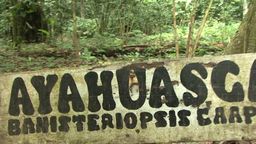 “Afluentes” are small rivers or streams that flow towards a bigger river or lake which, in this case, symbolize Ayahuasca. An ancient psychedelic brew that changes peoples’ perception and brought together, in this film, a teacher, a traveller and a desperate man to the same place. This documentary focuses on the increase of spiritual tourists in the Peruvian amazon, modern shamanism and the healing potentials of traditional plant medicine.
“Afluentes” are small rivers or streams that flow towards a bigger river or lake which, in this case, symbolize Ayahuasca. An ancient psychedelic brew that changes peoples’ perception and brought together, in this film, a teacher, a traveller and a desperate man to the same place. This documentary focuses on the increase of spiritual tourists in the Peruvian amazon, modern shamanism and the healing potentials of traditional plant medicine.
Director: Joao Meirinhos
Production: Granada Centre for Visual Anthropology, Manchester
Language of dialogues: Spanish
Language of subtitles: English, Czech
BA in Social Sciences and Cinema in Lisboa, MA in Visual Anthropology and Ethnographic film in Manchester, fieldworks in Portugal, Burkina Faso and Peru.
Španělsko, Francie, Baskicko, 2011, 85 min
A. Altuna
01.02.2015 14:00
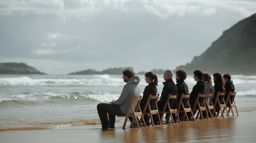 Bertsolari is a documentary filmed in 2011 and deals with the phenomenon of impromptu versifying in the Basque Country. The movie is a collage of improvised poems, poets’ narrations, academic comments and recordings from poetic sessions. It aims to point out this unique form of poetic improvisation as well as to stress the importance of improvised word for contemporary society.
Bertsolari is a documentary filmed in 2011 and deals with the phenomenon of impromptu versifying in the Basque Country. The movie is a collage of improvised poems, poets’ narrations, academic comments and recordings from poetic sessions. It aims to point out this unique form of poetic improvisation as well as to stress the importance of improvised word for contemporary society.
Director: Asier Altuna
Production: Txintxua Films
Camera: Gaizka Bourgeaud
Language of dialogues: Basque language, Spanish, English
Language of subtitles: English, Czech
Screenwriter and director Asier Altuna was born in Bergara (Basque Country) in 1969. He is famous for his films Aupa Etxebeste (2005) and Bertsolari (2011).
Švýcarsko, 2013, 95 min
T. Mendel
30.01.2015 21:00
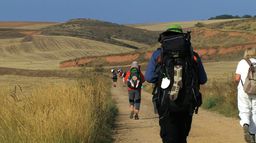 Whereas the label of «pilgrim» is still mostly associated with devout persons leaving home for purely religious motives, young people taking to the road as «backpackers» are generally perceived as pleasure seeking globetrotters. Questioning these stereotypes, anthropologist and filmmaker Tommi Mendel followed one young woman along the Way of St. James through France and Spain and another one along backpacking-routes through Thailand, Cambodia and Laos. Documenting their experiences and encounters over a period of three years, this film reveals intriguing parallels on various levels between what at first glance appear as two different ways of travelling. Common Roads is Tommi Mendel’s PhD-thesis accepted by the University of Zurich. It was supported by the Swiss National Science Foundation.
Whereas the label of «pilgrim» is still mostly associated with devout persons leaving home for purely religious motives, young people taking to the road as «backpackers» are generally perceived as pleasure seeking globetrotters. Questioning these stereotypes, anthropologist and filmmaker Tommi Mendel followed one young woman along the Way of St. James through France and Spain and another one along backpacking-routes through Thailand, Cambodia and Laos. Documenting their experiences and encounters over a period of three years, this film reveals intriguing parallels on various levels between what at first glance appear as two different ways of travelling. Common Roads is Tommi Mendel’s PhD-thesis accepted by the University of Zurich. It was supported by the Swiss National Science Foundation.
Director, camera, script, edit: Tommi Mendel
Production: Tigertoda productions
Language of dialogues: Swiss, German, English, Spanish, French
Language of dialogues: English, Czech
Tommi was born 1970 in Lucerne, Switzerland. He studied Social and Cultural Anthropology, Religious Studies and History at the University of Zurich with the focus on Visual Anthropology.
His MA-thesis is the ethnographic documentary film Arukihenro- walking pilgrims(2006), his PhD-thesis the ethnographic documentary filmCommon Roads (2013).
His ethnographic documentary Bunong´s Birth Practices between Tradition and Change (2010) won several prizes at international film festivals and was also screened at Antropofest in 2011
Tommi is a board member of the Audio-visual Commission of the Swiss Ethnological Society and an independent filmmaker.
Festivals (selection):
International Anthropological Filmfestival Ho Chi Minh City, Vietnam
Ethnographic Filmfestival Kratovo, Macedonia
Intimate Lens - Festival of Visual Anthropology, Caserta, Italy
Days of Ethnographic Film, Ljublana, Slovenia
NAFA International Ethnographic Film Festival, Isafjordur, Island
European Association of Social Anthropologists, Conference and Festival, Tallin, Estonia
Česká republika, 2013, 31 min
M.Pavlásek
31.01.2015 18:20
 Vojvodovo is a village in Bulgaria, inhabited in 1900 – 1950 by several hundred Czech Protestants. During their post-war re-emigration to the border areas of the South Moravia region of Czechoslovakia, they brought along with them the “spirit” of their world. The film tries to bring this world back through video-elicitation. Visual pictures of the Vojvodovo scene fade to the people who gradually fill the recording with the meaning of their experiences, just as a figurine symbolizing the community is being dressed in the film. Among the guardians of the legacy today, besides Vojvodovo and their offspring and descendants, are the professional ethnographers who have succumbed to the magic of Vojvodovo and who have taken part in the reconstruction of its picture with their texts. A similar role is played by the film itself, a multivocal visual narrative constructed both “here” and “there” (in South Moravia and in Bulgaria), another Vojvodovo. The aspect of geographic distance is suppressed, and in the foreground stands a mutuality distributed by professional ethnographers, the Internet, and meetings with (ex)Vojvodovians. All of which poses the question – where is Vojvodovo today?
Vojvodovo is a village in Bulgaria, inhabited in 1900 – 1950 by several hundred Czech Protestants. During their post-war re-emigration to the border areas of the South Moravia region of Czechoslovakia, they brought along with them the “spirit” of their world. The film tries to bring this world back through video-elicitation. Visual pictures of the Vojvodovo scene fade to the people who gradually fill the recording with the meaning of their experiences, just as a figurine symbolizing the community is being dressed in the film. Among the guardians of the legacy today, besides Vojvodovo and their offspring and descendants, are the professional ethnographers who have succumbed to the magic of Vojvodovo and who have taken part in the reconstruction of its picture with their texts. A similar role is played by the film itself, a multivocal visual narrative constructed both “here” and “there” (in South Moravia and in Bulgaria), another Vojvodovo. The aspect of geographic distance is suppressed, and in the foreground stands a mutuality distributed by professional ethnographers, the Internet, and meetings with (ex)Vojvodovians. All of which poses the question – where is Vojvodovo today?
Director, camera, script, edit: Michal Pavlásek
Production: The Institute of Ethnology of the Academy of Sciences of the Czech Republic, v.v.i.
Language of dialogues: Czech, Bulgarian
Language of subtitles: English
Michal Pavlásek is a researcher at Anthropictures – a flexible association of social scientists providing independent field research focused on visual and urban anthropology,
and a researcher at The Institute of Ethnology of the Academy of Sciences of the Czech Republic, v.v.i. Brno.
Dánsko, 2007, 30 min
Ch. Fentz
30.01.2015 19:00
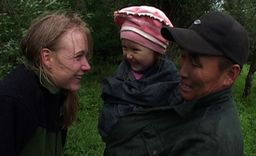 Three-year-old Jasmin is having her first haircut. Danish Benedikte has a daughter with Nazyn from Tuva in Siberia. She has chosen to follow the traditions of Nazyn’s shamanistic culture, and therefore Jasmin is now going to visit her dad in Tuva in order to follow the local tradition for three-year-old children: a ritual haircut. As a Danish mum, what elements to choose from the dad’s nomadic culture? We follow the mother and daughter on their family visit to faraway Tuva, six time zones away from Denmark.
Three-year-old Jasmin is having her first haircut. Danish Benedikte has a daughter with Nazyn from Tuva in Siberia. She has chosen to follow the traditions of Nazyn’s shamanistic culture, and therefore Jasmin is now going to visit her dad in Tuva in order to follow the local tradition for three-year-old children: a ritual haircut. As a Danish mum, what elements to choose from the dad’s nomadic culture? We follow the mother and daughter on their family visit to faraway Tuva, six time zones away from Denmark.
Director: Christine Fentz
Production: Ch. Fentz, co-produced Dánská národní televize a Turbinefilm
Camera: Kirsten Simonsen
Script Ch. Fentz, B. Moeller Kristensen
Edit: Formosa Film
Language of dialogues: Danish, Russian, Tuvan
Language of subtitles: English, Czech
Christine Fentz, MA in Dramaturgy, artistic director of Secret Hotel, creating participatory performing arts relating to landscapes.
Benedikte Moeller Kristensen, PhD student in anthropology, specializing in shamanistic practices and landscape relations among the reindeer nomads of NW-Mongolia and Tuva.
The movie was repetetivly shown at Danish National Television and on Swedish and Norwegian television. Also it has been shown on some film festivals in the Nordic countries.
Nizozemí, Irák, Velká Británie, 2014, 27 min
L. Askari
30.01.2015 20:00
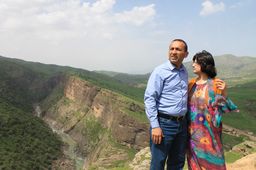
After having lived in the Netherlands for over 20 years, my parents, Gulzar and Shwan, decided to return to Kurdistan. Escaping the Iraqi regime as refugees in the early 90s, Kurdistan has recently developed into a regional safe-haven. However, with current tensions around ISIS, the social and political landscape is changing drastically. Haraka Baraka tells the story of my parents’ return to their homeland.
FESTIVALS PREMIERE
Director, Camera, Production, Edit, Script: Lana Askari
Language of dialogues: Kurdish, Dutch, English
Language of subtitles: English, Czech
Lana Askari holds a BA in Liberal Arts & Sciences from University College Utrecht, and an MPhil in Social Anthropology from the University of Cambridge. Her research interests include museum- and visual anthropology, trauma and memory, post-conflict regions, Kurdish diaspora and the anthropology of death. Trained as a documentary filmmaker through the MA programme at the Granada Centre for Visual Anthropology, she recently commenced her PhD at the University of Manchester on Kurdish returnees in Iraqi Kurdistan.
Německo, 2013, 38 min
M. Gruber
31.01.2015 21:40
 The film “Honey” depicts the production of honey from wild bees as well as different aspects of honey consumption in the highlands of central Angola where honey is an important means of subsistence and cash income. The film was conceived and shot by a group of villagers from the Cusseque area. “Honey” is the outcome of participatory film workshop organised by Martin Gruber and Miquel Hilario for the interdisciplinary research project “The Future Okavango”, investigating sustainable resource management in the Okavango Basin.
The film “Honey” depicts the production of honey from wild bees as well as different aspects of honey consumption in the highlands of central Angola where honey is an important means of subsistence and cash income. The film was conceived and shot by a group of villagers from the Cusseque area. “Honey” is the outcome of participatory film workshop organised by Martin Gruber and Miquel Hilario for the interdisciplinary research project “The Future Okavango”, investigating sustainable resource management in the Okavango Basin.
Director: Martin Gruber
Production: Martin Gruber
Camera: A.Antónia, M. Gruber, M.S. Hilario, H.B. Job, F. Jose, E. Quintas
Script:A.Antónia, M. Gruber, M.S. Hilario, H.B. Job, F. Jose, E. Quintas
Edit: M. Gruber, M.S. Hilario, M.P. d Santos
Language of dialogues: Chokwe, Portuguese
Language of subtitles: English, Portuguese, Czech
Martin Gruber studied Visual Anthropology at Goldsmiths College, London and Social Anthropology at Hamburg University. He works as an ethnographic researcher and filmmaker and teaches visual anthropology. Martin recently completed a PhD on participatory ethnographic filmmaking at the Department of Anthropology and Cultural Studies, University of Bremen.
Festivals (selection):
Days of Ethnographic Cinema, Moscow
EASA Conference Film Program, Tallin, Estonsko
NAFA Film Festival, Isafjordur, Iceland
Days of Ethnographic Film, Bremen, Germany
Česká republika, 2014, 63 min
L.Šavelková, T.Petráň, M.Durňak
29.01.2015 20:05
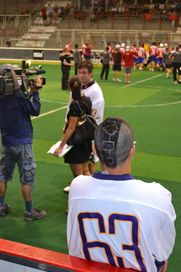 The film is about the lacrosse, and its importance for the Haudenosaunee people (represented by the Iroquois Nationals), and for the Czech people (represented by the lacrosse organisations, scouts, and woodcrafters). In 2011, the World Indoor Lacrosse Championship was held in Prague, the Czech Republic. It was the first time when the Iroquois National lacrosse men’s team visited the Czech Republic, using their Haudenosaunee passports.
The film is about the lacrosse, and its importance for the Haudenosaunee people (represented by the Iroquois Nationals), and for the Czech people (represented by the lacrosse organisations, scouts, and woodcrafters). In 2011, the World Indoor Lacrosse Championship was held in Prague, the Czech Republic. It was the first time when the Iroquois National lacrosse men’s team visited the Czech Republic, using their Haudenosaunee passports.
However, the film is not focused only on reporting of the Championship agenda. Furthermore, it highlights the essential spiritual, political and sport aspects of the lacrosse for the Haudenosaunne and Czech communities. It also explains the formation of this originally Native American game in the Central Europe, including the hint of political issues in the former communist Czechoslovakia.
PREMIERE!
Directors: L.Šavelková, T. Petráň, M. Durňak
Production Cinepoint
Camera: T.Petráň, M.Durňak, V. Barák, P.Řezáč, P. Záruba
Script: L.Šavelková
Edit: T.Petráň, M.Durňak
Language of dialogues: Czech, English
Langue of subtitles: Czech, English
Lívia Šavelková – graduated from Charles University in Prague in ethnology and journalism at the Faculty of Arts and the Faculty of Social Sciences. She is fond of Lacrosse and since 2011 she and her colleagues have been revealing various forms and meanings of the lacrosse in different parts of the world. She works at the Faculty of Arts, University of Pardubice, Czech Republic.
Tomáš Petráň – a filmmaker, teacher and also a farmer. He graduated from and also teaches at The Film and TV School of Academy of Performing Arts in Prague. He has produced a lot of documentary films, articles and also a book related to visual anthropology. He developed visual anthropology at the Department of Social Sciences at University of Pardubice between 2009 and 2013.
Milan Durňak – “an ethnologist with a camera in his hands”. He graduated from Charles University in Prague in ethnology at the Faculty of Arts. His thesis was based on film trilogy TUMENGE/screened at Antropofest and Ethnofilm Čadca 2012/. He is a PhD candidate and continues in experimenting with visual anthropology.
Česká republika, 2015, 60 min
L. Šavelková, M. Durňak
31.01.2015 14:00
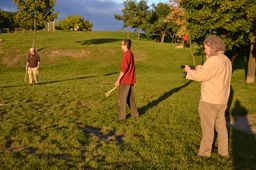 The filmmakers will discuss the context and production of the film. Various ways of viewing the film will be debated. The presentation will also focus on the question how the awareness of different audiences and groups depicted and related to the film affects the filmmakers’ final product.
The filmmakers will discuss the context and production of the film. Various ways of viewing the film will be debated. The presentation will also focus on the question how the awareness of different audiences and groups depicted and related to the film affects the filmmakers’ final product.
(Café Jedna, Národní Galerie, Dukelských hrdinnů 530/47, Praha 7).
USA, 2014, 18 min
Ch.M. Janney
31.01.2015 19:40
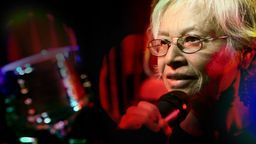 Elva Ambía Rebatta’s first language is Quechua, but when she left her town in Peru as a young woman to find work in the United States, speaking Spanish and English became critical for her to survive. While Quechua – a language indigenous to South America – continues to be spoken around the world as a result of such migration stories, UNESCO and other initiatives recognize it as an endangered language. Now in her seventies, Elva decides to help cultivate a Quechua-speaking community in New York City. Living Quechua follows Elva through the challenges and successes of trying to keep Quechua alive.
Elva Ambía Rebatta’s first language is Quechua, but when she left her town in Peru as a young woman to find work in the United States, speaking Spanish and English became critical for her to survive. While Quechua – a language indigenous to South America – continues to be spoken around the world as a result of such migration stories, UNESCO and other initiatives recognize it as an endangered language. Now in her seventies, Elva decides to help cultivate a Quechua-speaking community in New York City. Living Quechua follows Elva through the challenges and successes of trying to keep Quechua alive.
Director, production, camera, script, edit: Christine Mladic Janney
Language of dialogues: Spanish, Quechua, English
Language of subtitles: English, Czech
Christine Mladic Janney is a Brooklyn-based filmmaker, photographer and digital media maker. She is currently pursuing a PhD in Sociocultural Anthropology and certificate in Culture and Media at NYU.
Festival:
Margaret Mead Film Festival, New York City, USA
Česká republika, 2014, 12 min
R. Mezníková, A.Košařová, K. Procházková
31.01.2015 17:15
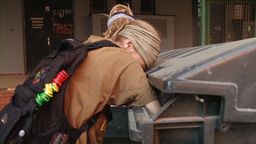 The movie is about an activity called dumpster diving which is picking food or other objects from dumpsters. The protagonists of the movie are Vojta and Milan who disagree with the excessive waste of food. The authors are discovering the world of dumpster diving and gradually experience the transformation of food from trash into an edible dish.
The movie is about an activity called dumpster diving which is picking food or other objects from dumpsters. The protagonists of the movie are Vojta and Milan who disagree with the excessive waste of food. The authors are discovering the world of dumpster diving and gradually experience the transformation of food from trash into an edible dish.
PREMIERE
Directors: R. Mezníková, A.Košařová, K. Procházková
Production: Studio vizuální etnografie, Katedra antropologie FF ZČU
Camera: Adéla Košařová
Script: Radka Mezníková
Edit: Šimon Špidla
Language of dialogues: Czech
Language of subtitles: none
Filmmakers are students of Social and Cultural Anthropology at University of West Bohemia in Pilsen, Czech Republic.
Norsko, 2014, 37 min
F. Storaas, R. Scott, G. Kassa
31.01.2015 20:30
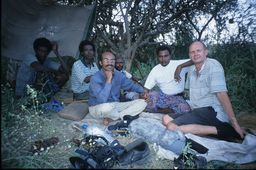 A woman is reported killed - another case for Hussein.The Islamic pastoral Afars inhabit the north eastern rangelands of Ethiopia. Some have settled in towns and trade centres where also the Ethiopian government is present with the police and other government officials. Many Afars have a foot in both sectors, having a home in town while maintaining close contact with their nomadic relatives. Hussein Hayie has a government position as Peace and Security officer. His work is to judge whether an incident should be handled as a criminal case for the police or be left as a case to be solved the traditional way by the elders of the clans. The Afar political organization is based on both territory and kinship. The political institutions are geared towards social control and the resolution of conflicts. The tribal leaders are often called upon to intervene before a small matter escalates to homicide and if homicide occurs, to work out agreements of compensation in order to avoid blood-feuds. The film follows Hussein Hayie in town and when he visits his families in the nomadic camps. As a government employee he is continuously on duty and in the film we see how he is called to act.
A woman is reported killed - another case for Hussein.The Islamic pastoral Afars inhabit the north eastern rangelands of Ethiopia. Some have settled in towns and trade centres where also the Ethiopian government is present with the police and other government officials. Many Afars have a foot in both sectors, having a home in town while maintaining close contact with their nomadic relatives. Hussein Hayie has a government position as Peace and Security officer. His work is to judge whether an incident should be handled as a criminal case for the police or be left as a case to be solved the traditional way by the elders of the clans. The Afar political organization is based on both territory and kinship. The political institutions are geared towards social control and the resolution of conflicts. The tribal leaders are often called upon to intervene before a small matter escalates to homicide and if homicide occurs, to work out agreements of compensation in order to avoid blood-feuds. The film follows Hussein Hayie in town and when he visits his families in the nomadic camps. As a government employee he is continuously on duty and in the film we see how he is called to act.
Directors: Frode Storaas, Rolf Scott, Getachew Kassa
Production: Universiy Museum of Bergen, Norway
Language of dialogues: Afar, Amharic
Language of subtitles: English, Czech
Frode Storaas, professor, University Museum of Bergen, Norway
Rolf Scott, PhD-candidate, University of Bergen, Norway
Getachew Kassa, Associate professor, Addis Ababa University
Festivals (selection):
GIEFF in Gottingen, Germany
EASA in Tallllin, Estonia
NAFA in Island
AAA in Washington DC, USA
Ethnographic Cinema, Moscow
Egypt, 2014, 28 min
B. Dunne
30.01.2015 19:30
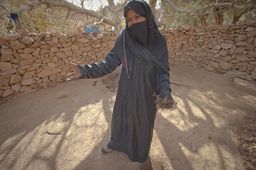 The Orchard keepers takes us on a journey into the rugged the Sinai desert. Behind intricate stonewalls we meet Dr. Ahmad, the last surviving herbalist trained in the ancient ways of desert healing. But it is Amariya – the resilient and exuberant naturalist whose scars and charms dominate the tale. Her relationship to the land has transformed her life in unlikely ways. The Orchard keepers pays homage to her hypnotic freedom.
The Orchard keepers takes us on a journey into the rugged the Sinai desert. Behind intricate stonewalls we meet Dr. Ahmad, the last surviving herbalist trained in the ancient ways of desert healing. But it is Amariya – the resilient and exuberant naturalist whose scars and charms dominate the tale. Her relationship to the land has transformed her life in unlikely ways. The Orchard keepers pays homage to her hypnotic freedom.
For filmmaker Bryony Dunne, what began as a short photography trip to focus on the few remaining orchards, evolved into a personal breakthrough. After living for a year with the Gabaliya tribe, she gained unique insight into the stratified tribal structures and layers of myth that enshroud the mountain region.
Director, Script, Camera: Bryony Dunne
Production: Les Film du Renard
Edit: Julien Schmid, Tamer Ashry
Language of dialogues: English, Arabic
Language of subtitles: English, Czech
Bryony Dunne is an Irish artist based in Cairo whose work engages Anthropology, Sociology, Ecology and Visual Arts. Her various projects have sought to explore human’s relationship with the landscape, and the evolution of cultivation and settlements. Working through installations, film and photography, she explores concepts of intangible cultural heritage, myths and traditional practices. She holds a position teaching still image at the German University in Cairo.
Festivals (selection):
Ismallia International Film Festival, Egypt
Saratov International Film Festival, Russia
Banff Mountain International Film Festival, Alberta, Canada
Goldsmiths University, Dep. of Visual Anthropology, London, UK
German University, Cairo, Egypt
Bilbao Mountain Film Festival, Spain
Burkina Faso, Španělsko, 2014, 15 min
E. Molina
31.01.2015 21:25
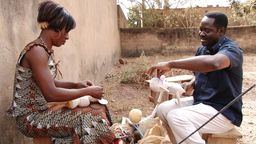 After dedicating the whole of his life to puppets, Desirée has had to abandon them for a while.
After dedicating the whole of his life to puppets, Desirée has had to abandon them for a while.
However his friend Fabe, among her various jobs has decided to create her own puppet performance to teach children how important it is to attend school.
A cemetery of puppets in Ouagadougou, Burkina Faso, is the starting point of this story full of dreams and aims.
Director, camera, script, edit: Elena Molina
Production: Ariadna Dot
Language of subtitles: French
Language of dialogues: English, Czech
Elena Molina graduated in Audiovisual Communication at the “Universidad Complutense” in Madrid (Spain). Completed her studies at the “Università degli Studi di Perugia” (Italy) and “Universitat Pompeu Fabra” in Barcelona (Spain) in 2005.
She collaborated with several Spanish production companies as Playtime sl., Canónigo Films, Kilimanjaro Prod., BNC productions, etc. as assistant director, cinematographer and editor.
She loves documentary films, and she has two years’ experience as a director of short documentary pieces for Catalunya Television (Channel 33) and also she collaborated in the production and photography of the last four editions of the Creative Documentary Workshop of the Francesca Bonnemaison Women Cultural Centre in Barcelona.
Festivals (selection):
Film Festival for Women in Harare, Zimbabwe
Women and Films Festival - Best short Doc Award
Femcine, Santiago, Chile
Festival Int. Cine, Pamplona, Spain
Česká republika, 2014, 8 min
A. Dvořáková
31.01.2015 17:30
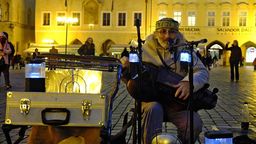 The movie is playing out in the streets of Prague and presents us Jiří who has been earning a living as a street musician for a couple of years. In the interview, Jiří reflects the issue of the legitimacy in Prague and ever-changing permissions for street production. Last but not least, the movie provides an insight into the conflicts and friendships which are developing in the streets every single day.
The movie is playing out in the streets of Prague and presents us Jiří who has been earning a living as a street musician for a couple of years. In the interview, Jiří reflects the issue of the legitimacy in Prague and ever-changing permissions for street production. Last but not least, the movie provides an insight into the conflicts and friendships which are developing in the streets every single day.
Director, production, camera, edit: Anna Dvořáková
Language of dialogues: Czech
Language of subtitles: none
Anna study MA in Social Anthropology at University of Pardubice, Czech Republic.
Váchán, 2014, 60 min
Libor Dušek
30.01.2015 18:00
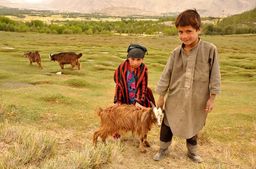 Social anthropologist Libor Dusek conduct field research in the high mountains of Central Asia (Pamir, Hindu Kush) for ten years. His photographs capture ethnic group of Wakhan in the territory of three countries: Afghanistan, Pakistan and Tajikistan in August-October 2014.
Social anthropologist Libor Dusek conduct field research in the high mountains of Central Asia (Pamir, Hindu Kush) for ten years. His photographs capture ethnic group of Wakhan in the territory of three countries: Afghanistan, Pakistan and Tajikistan in August-October 2014.
Srbsko, Velká Británie, 2014, 30 min
M. Wynants
31.01.2015 17:50
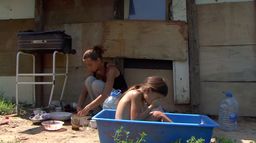 Jasmina, Toplica and Claudia live in an informal settlement on the outskirts of Belgrade. Like other Roma families in the neighbouring shacks, they live in extreme poverty as a result of discrimination and exclusion. Through experience of migration and deportation to and from Germany, Jasmina lives separated from her parents and brothers.This film looks into the struggles of making a living on the margins of society. It also explores how the protagonists remember life in Western Europe and hope to go back there in the near future. Jasmina’s and Tony’s everyday life is permeated by thoughts of escaping, migrating and providing Jasmina’s daughter with a better prospect of life.
Jasmina, Toplica and Claudia live in an informal settlement on the outskirts of Belgrade. Like other Roma families in the neighbouring shacks, they live in extreme poverty as a result of discrimination and exclusion. Through experience of migration and deportation to and from Germany, Jasmina lives separated from her parents and brothers.This film looks into the struggles of making a living on the margins of society. It also explores how the protagonists remember life in Western Europe and hope to go back there in the near future. Jasmina’s and Tony’s everyday life is permeated by thoughts of escaping, migrating and providing Jasmina’s daughter with a better prospect of life.
Director, camera, script, edit: Marlene Wynants
Production: Marlene Wynants and Granada Centre for Visual Anthropology, Manchester
Language of dialogues: German, Serbian, Romani
Language of subtitles: English, Czech
Marlene Wynants studied a BA in Social and Cultral Anthropology in Hamburg and an MA in Visual Anthropology at the University of Manchester. This film is final project of the MA at the Granada Centre for Visual Anthropology.
 “Afluentes” are small rivers or streams that flow towards a bigger river or lake which, in this case, symbolize Ayahuasca. An ancient psychedelic brew that changes peoples’ perception and brought together, in this film, a teacher, a traveller and a desperate man to the same place. This documentary focuses on the increase of spiritual tourists in the Peruvian amazon, modern shamanism and the healing potentials of traditional plant medicine.
“Afluentes” are small rivers or streams that flow towards a bigger river or lake which, in this case, symbolize Ayahuasca. An ancient psychedelic brew that changes peoples’ perception and brought together, in this film, a teacher, a traveller and a desperate man to the same place. This documentary focuses on the increase of spiritual tourists in the Peruvian amazon, modern shamanism and the healing potentials of traditional plant medicine.
 Bertsolari is a documentary filmed in 2011 and deals with the phenomenon of impromptu versifying in the Basque Country. The movie is a collage of improvised poems, poets’ narrations, academic comments and recordings from poetic sessions. It aims to point out this unique form of poetic improvisation as well as to stress the importance of improvised word for contemporary society.
Bertsolari is a documentary filmed in 2011 and deals with the phenomenon of impromptu versifying in the Basque Country. The movie is a collage of improvised poems, poets’ narrations, academic comments and recordings from poetic sessions. It aims to point out this unique form of poetic improvisation as well as to stress the importance of improvised word for contemporary society. Whereas the label of «pilgrim» is still mostly associated with devout persons leaving home for purely religious motives, young people taking to the road as «backpackers» are generally perceived as pleasure seeking globetrotters. Questioning these stereotypes, anthropologist and filmmaker Tommi Mendel followed one young woman along the Way of St. James through France and Spain and another one along backpacking-routes through Thailand, Cambodia and Laos. Documenting their experiences and encounters over a period of three years, this film reveals intriguing parallels on various levels between what at first glance appear as two different ways of travelling. Common Roads is Tommi Mendel’s PhD-thesis accepted by the University of Zurich. It was supported by the Swiss National Science Foundation.
Whereas the label of «pilgrim» is still mostly associated with devout persons leaving home for purely religious motives, young people taking to the road as «backpackers» are generally perceived as pleasure seeking globetrotters. Questioning these stereotypes, anthropologist and filmmaker Tommi Mendel followed one young woman along the Way of St. James through France and Spain and another one along backpacking-routes through Thailand, Cambodia and Laos. Documenting their experiences and encounters over a period of three years, this film reveals intriguing parallels on various levels between what at first glance appear as two different ways of travelling. Common Roads is Tommi Mendel’s PhD-thesis accepted by the University of Zurich. It was supported by the Swiss National Science Foundation. Vojvodovo is a village in Bulgaria, inhabited in 1900 – 1950 by several hundred Czech Protestants. During their post-war re-emigration to the border areas of the South Moravia region of Czechoslovakia, they brought along with them the “spirit” of their world. The film tries to bring this world back through video-elicitation. Visual pictures of the Vojvodovo scene fade to the people who gradually fill the recording with the meaning of their experiences, just as a figurine symbolizing the community is being dressed in the film. Among the guardians of the legacy today, besides Vojvodovo and their offspring and descendants, are the professional ethnographers who have succumbed to the magic of Vojvodovo and who have taken part in the reconstruction of its picture with their texts. A similar role is played by the film itself, a multivocal visual narrative constructed both “here” and “there” (in South Moravia and in Bulgaria), another Vojvodovo. The aspect of geographic distance is suppressed, and in the foreground stands a mutuality distributed by professional ethnographers, the Internet, and meetings with (ex)Vojvodovians. All of which poses the question – where is Vojvodovo today?
Vojvodovo is a village in Bulgaria, inhabited in 1900 – 1950 by several hundred Czech Protestants. During their post-war re-emigration to the border areas of the South Moravia region of Czechoslovakia, they brought along with them the “spirit” of their world. The film tries to bring this world back through video-elicitation. Visual pictures of the Vojvodovo scene fade to the people who gradually fill the recording with the meaning of their experiences, just as a figurine symbolizing the community is being dressed in the film. Among the guardians of the legacy today, besides Vojvodovo and their offspring and descendants, are the professional ethnographers who have succumbed to the magic of Vojvodovo and who have taken part in the reconstruction of its picture with their texts. A similar role is played by the film itself, a multivocal visual narrative constructed both “here” and “there” (in South Moravia and in Bulgaria), another Vojvodovo. The aspect of geographic distance is suppressed, and in the foreground stands a mutuality distributed by professional ethnographers, the Internet, and meetings with (ex)Vojvodovians. All of which poses the question – where is Vojvodovo today? Three-year-old Jasmin is having her first haircut. Danish Benedikte has a daughter with Nazyn from Tuva in Siberia. She has chosen to follow the traditions of Nazyn’s shamanistic culture, and therefore Jasmin is now going to visit her dad in Tuva in order to follow the local tradition for three-year-old children: a ritual haircut. As a Danish mum, what elements to choose from the dad’s nomadic culture? We follow the mother and daughter on their family visit to faraway Tuva, six time zones away from Denmark.
Three-year-old Jasmin is having her first haircut. Danish Benedikte has a daughter with Nazyn from Tuva in Siberia. She has chosen to follow the traditions of Nazyn’s shamanistic culture, and therefore Jasmin is now going to visit her dad in Tuva in order to follow the local tradition for three-year-old children: a ritual haircut. As a Danish mum, what elements to choose from the dad’s nomadic culture? We follow the mother and daughter on their family visit to faraway Tuva, six time zones away from Denmark.
 The film “Honey” depicts the production of honey from wild bees as well as different aspects of honey consumption in the highlands of central Angola where honey is an important means of subsistence and cash income. The film was conceived and shot by a group of villagers from the Cusseque area. “Honey” is the outcome of participatory film workshop organised by Martin Gruber and Miquel Hilario for the interdisciplinary research project “The Future Okavango”, investigating sustainable resource management in the Okavango Basin.
The film “Honey” depicts the production of honey from wild bees as well as different aspects of honey consumption in the highlands of central Angola where honey is an important means of subsistence and cash income. The film was conceived and shot by a group of villagers from the Cusseque area. “Honey” is the outcome of participatory film workshop organised by Martin Gruber and Miquel Hilario for the interdisciplinary research project “The Future Okavango”, investigating sustainable resource management in the Okavango Basin. The film is about the lacrosse, and its importance for the Haudenosaunee people (represented by the Iroquois Nationals), and for the Czech people (represented by the lacrosse organisations, scouts, and woodcrafters). In 2011, the World Indoor Lacrosse Championship was held in Prague, the Czech Republic. It was the first time when the Iroquois National lacrosse men’s team visited the Czech Republic, using their Haudenosaunee passports.
The film is about the lacrosse, and its importance for the Haudenosaunee people (represented by the Iroquois Nationals), and for the Czech people (represented by the lacrosse organisations, scouts, and woodcrafters). In 2011, the World Indoor Lacrosse Championship was held in Prague, the Czech Republic. It was the first time when the Iroquois National lacrosse men’s team visited the Czech Republic, using their Haudenosaunee passports.
 Elva Ambía Rebatta’s first language is Quechua, but when she left her town in Peru as a young woman to find work in the United States, speaking Spanish and English became critical for her to survive. While Quechua – a language indigenous to South America – continues to be spoken around the world as a result of such migration stories, UNESCO and other initiatives recognize it as an endangered language. Now in her seventies, Elva decides to help cultivate a Quechua-speaking community in New York City. Living Quechua follows Elva through the challenges and successes of trying to keep Quechua alive.
Elva Ambía Rebatta’s first language is Quechua, but when she left her town in Peru as a young woman to find work in the United States, speaking Spanish and English became critical for her to survive. While Quechua – a language indigenous to South America – continues to be spoken around the world as a result of such migration stories, UNESCO and other initiatives recognize it as an endangered language. Now in her seventies, Elva decides to help cultivate a Quechua-speaking community in New York City. Living Quechua follows Elva through the challenges and successes of trying to keep Quechua alive. The movie is about an activity called dumpster diving which is picking food or other objects from dumpsters. The protagonists of the movie are Vojta and Milan who disagree with the excessive waste of food. The authors are discovering the world of dumpster diving and gradually experience the transformation of food from trash into an edible dish.
The movie is about an activity called dumpster diving which is picking food or other objects from dumpsters. The protagonists of the movie are Vojta and Milan who disagree with the excessive waste of food. The authors are discovering the world of dumpster diving and gradually experience the transformation of food from trash into an edible dish. A woman is reported killed - another case for Hussein.The Islamic pastoral Afars inhabit the north eastern rangelands of Ethiopia. Some have settled in towns and trade centres where also the Ethiopian government is present with the police and other government officials. Many Afars have a foot in both sectors, having a home in town while maintaining close contact with their nomadic relatives. Hussein Hayie has a government position as Peace and Security officer. His work is to judge whether an incident should be handled as a criminal case for the police or be left as a case to be solved the traditional way by the elders of the clans. The Afar political organization is based on both territory and kinship. The political institutions are geared towards social control and the resolution of conflicts. The tribal leaders are often called upon to intervene before a small matter escalates to homicide and if homicide occurs, to work out agreements of compensation in order to avoid blood-feuds. The film follows Hussein Hayie in town and when he visits his families in the nomadic camps. As a government employee he is continuously on duty and in the film we see how he is called to act.
A woman is reported killed - another case for Hussein.The Islamic pastoral Afars inhabit the north eastern rangelands of Ethiopia. Some have settled in towns and trade centres where also the Ethiopian government is present with the police and other government officials. Many Afars have a foot in both sectors, having a home in town while maintaining close contact with their nomadic relatives. Hussein Hayie has a government position as Peace and Security officer. His work is to judge whether an incident should be handled as a criminal case for the police or be left as a case to be solved the traditional way by the elders of the clans. The Afar political organization is based on both territory and kinship. The political institutions are geared towards social control and the resolution of conflicts. The tribal leaders are often called upon to intervene before a small matter escalates to homicide and if homicide occurs, to work out agreements of compensation in order to avoid blood-feuds. The film follows Hussein Hayie in town and when he visits his families in the nomadic camps. As a government employee he is continuously on duty and in the film we see how he is called to act. The Orchard keepers takes us on a journey into the rugged the Sinai desert. Behind intricate stonewalls we meet Dr. Ahmad, the last surviving herbalist trained in the ancient ways of desert healing. But it is Amariya – the resilient and exuberant naturalist whose scars and charms dominate the tale. Her relationship to the land has transformed her life in unlikely ways. The Orchard keepers pays homage to her hypnotic freedom.
The Orchard keepers takes us on a journey into the rugged the Sinai desert. Behind intricate stonewalls we meet Dr. Ahmad, the last surviving herbalist trained in the ancient ways of desert healing. But it is Amariya – the resilient and exuberant naturalist whose scars and charms dominate the tale. Her relationship to the land has transformed her life in unlikely ways. The Orchard keepers pays homage to her hypnotic freedom.  After dedicating the whole of his life to puppets, Desirée has had to abandon them for a while.
After dedicating the whole of his life to puppets, Desirée has had to abandon them for a while. The movie is playing out in the streets of Prague and presents us Jiří who has been earning a living as a street musician for a couple of years. In the interview, Jiří reflects the issue of the legitimacy in Prague and ever-changing permissions for street production. Last but not least, the movie provides an insight into the conflicts and friendships which are developing in the streets every single day.
The movie is playing out in the streets of Prague and presents us Jiří who has been earning a living as a street musician for a couple of years. In the interview, Jiří reflects the issue of the legitimacy in Prague and ever-changing permissions for street production. Last but not least, the movie provides an insight into the conflicts and friendships which are developing in the streets every single day.
 Jasmina, Toplica and Claudia live in an informal settlement on the outskirts of Belgrade. Like other Roma families in the neighbouring shacks, they live in extreme poverty as a result of discrimination and exclusion. Through experience of migration and deportation to and from Germany, Jasmina lives separated from her parents and brothers.This film looks into the struggles of making a living on the margins of society. It also explores how the protagonists remember life in Western Europe and hope to go back there in the near future. Jasmina’s and Tony’s everyday life is permeated by thoughts of escaping, migrating and providing Jasmina’s daughter with a better prospect of life.
Jasmina, Toplica and Claudia live in an informal settlement on the outskirts of Belgrade. Like other Roma families in the neighbouring shacks, they live in extreme poverty as a result of discrimination and exclusion. Through experience of migration and deportation to and from Germany, Jasmina lives separated from her parents and brothers.This film looks into the struggles of making a living on the margins of society. It also explores how the protagonists remember life in Western Europe and hope to go back there in the near future. Jasmina’s and Tony’s everyday life is permeated by thoughts of escaping, migrating and providing Jasmina’s daughter with a better prospect of life.